D.A. Cairns's Blog, page 3
April 9, 2021
The Mirror: The Way of all Flesh
You've probably heard the expression 'gone the way of all flesh' meaning that someone has died. However, you may not know that this expression comes from the Old Testament. Check out Joshua 22:14 and 1 Kings 2:2 which say, depending on the translation, 'go the way of all the earth' or 'go the way of all flesh.' I did not know this until I researched it for this post, but I'm not surprised, as many common sayings are either bible quotes or bastardizations of them.
The title of Samuel Butler's classic semi autobiographical novel, The Way of all Flesh, is then a most appropriate title because the protagonist is a clergyman. Written by Butler between 1873 and 1884, the novel is an attack on Victorian era hypocrisy.
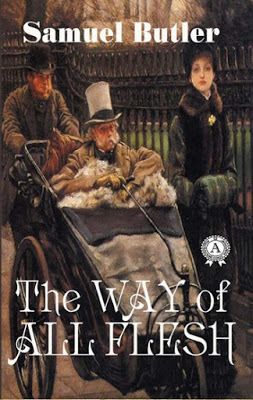
Classic novels may not be your thing, and I suspect it's probably because of the writing style. Being lexically dense, with old fashioned words and extremely long and complex sentences doesn't always facilitate easy reading, but I love this stuff. The themes explored by Butler in The Way of all Flesh: hypocrisy, religion, faith, atheism, nature versus nurture and family dynamics may well be oft explored ideas, but the classics have a precision and depth in their language use which is, although not rare in modern novels, certainly different. We should remember classical writers were not competing with nor were they influenced by film and television. In any case, the skill of the writer in dealing with universal themes to which everyone can relate, is to challenge the view of the reader; to make them think.
I've been posting quotes from The Way of all Flesh regularly on Facebook, since I began reading it. When I read something and I have stop, and re read it, and contemplate it, allowing it to filter through my worldview, I know I am reading quality and inspired writing. The quote I want to share in this post is one I found particularly pertinent as I am currently facilitating the journey of another group of men through the Valiant Man sexual discipleship program. This quote contains information about the main character which may be considered a 'spoiler'.
"Although in the healthy atmosphere of such a school as Roughborough you can have come across contaminating influences; you were probably, I may say certainly, impressed at school with the heinousness of any attempt to depart from the strictest chastity until such time as you had entered into a state of matrimony. At Cambridge you were shielded from impurity by every obstacle which virtuous and vigilant authorities could devise, and even had the obstacles been fewer, your parents probably took care that your means should not admit of your throwing money away upon abandoned characters. At night proctors patrolled the street and dogged your steps if you tried to go into any haunt where the presence of vice was suspected. By day the females who were admitted within the college walls were selected mainly on the score of age and ugliness. It is hard to see what more can be done for any young man than this.
For the last four or five months you have been a clergyman, and if a single impure thought had still remained within your mind, ordination should have removed it: nevertheless, not only does it appear that your mind is as impure as though none of the influences to which I have referred had been brought to bear upon it, but it seems as though their only result had been this-that you have not even the common sense to be able to distinguish between a respectable girl and a prostitute."
What I like about this quote is that it very accurately displays the ignorance and arrogance of men regarding sexuality. Good men get into trouble when they forget they are men. Most men are good at being providers for and defenders of their loved ones, but we are also good at ignoring danger and pandering to our weaknesses and addictions. It never ends well for the man who cannot control his sex drive.
February 18, 2021
RelationDips: Engineering Families Part 2
I’ve been a fan of Neighbours since it first came on our screens back in 1985. When I say fan, it isn’t my favourite show, not by a long shot and I haven’t seen every episode. I don’t have a dedicated blog. I’m not a member of any fan clubs and my knowledge of the show, the revolving plots, cast of characters and the actors who play them is not deep. However, these days I rarely miss an episode, most often watching catch ups on Tenplay. Usually, at any given time, I can tell you what’s going on. Occasionally, I lose interest with certain storylines and characters. At other times, I get right into it. There’s a current thread about a twenty-year marriage ending. Shane and Dipi. Shane lost the plot with a drug addiction. Dipi had an affair. The affair was explosively revealed by people with alterior motives. Shane moved on with Amy who made him happy and accepted him the way he was. Dipi declared her love for Shane and wants to get back together. Shane says no way. I can’t forgive you. Not a far-fetched storyline at all. I should know. I lived it.
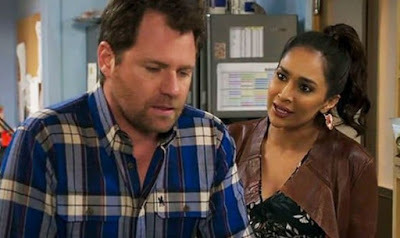
Neighbours is a classic soap opera. Everything that happens, though based on very plausible scenarios, is next level dramatic and intense. People are always saying they’ll never forgive someone for what they did. Then after a few more episodes, they do. All the main characters live in the same street, Ramsay Street, and work in the same suburb, Erinsborough. There’s always someone in Erinsborough Hospital. Two of the residents of Ramsey Street work there. There’s always a police drama. Two police officers live in Ramsay Street as well. You get the picture. The potential for drama is untold and for entertainment’s sake is often ridiculous. The various threads are sometimes light, sometimes heavy, but always fun…if you like soap operas.
An interesting subtext to the imaginary lives of Ramsay Street residents is the social engineering which drives both the creation of characters and storylines. Here’s a few examples.
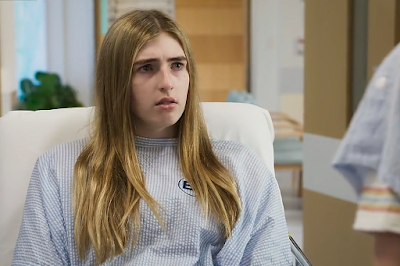
1. - Mackenzie is a transgender character who, not long after joining the regular cast, had her final gender reassignment surgery.
2. - David and Aaron are a same sex attracted couple who after experimenting with foster care, enlisted the help of their same sex attracted female housemate to ‘have a baby with them.’
3. - The newest teacher recruit at Erinsborough High is deaf. The actor wears a Cochlear implant and plays a deaf teacher on the show.
4. - Terese, who runs Lassiter’s Hotel, retracted an earlier, politically incorrect Australia Day statement, in order to make amends on the Australia Day episode.
Three of these four are controversial issues which the producers and writers of Neighbours, clearly very liberal thinkers (aka ‘tolerant and inclusive’ in newspeak), are not afraid to tackle. And why would they be? The deliberate move towards ‘normalizing’ people who have traditionally been marginalised by mainstream society and discriminated against because they are different is not necessarily a bad thing. However, it does mean, that because minority groups have to be given equal status and equal opportunity, we now have a situation in which the microcosm of a television show does not actually reflect the composition of society. What we see is what the makers of these shows want us to see. Ramsay Street has a transgender character, a same sex attracted male couple, and a same sex attracted female who injected herself with sperm so she and her friends could have a baby together. What they don’t have is anyone profoundly disabled, regular indigenous characters or anyone from an ethnic minority who migrated to Australia with poor English. Never mind those minority groups though.
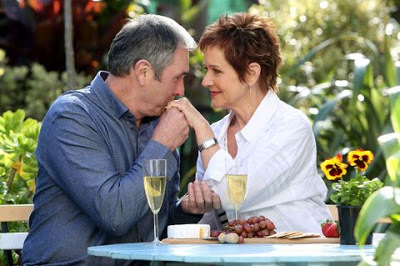
Getting back to the broader issue of families, Karl and Susan Kennedy are Ramsay Streets grandparents who have operated as defacto parents for many ‘strays’ over the years since their own children grew up and moved away. For example, Hendrix is currently living with them after his father’s marriage ended and he moved away. (His father is the guy who had the affair with Dipi.) The idea that families are no longer narrowly defined along the traditional lines of mother, father and biological children is simply an acknowledgment of reality. However, the concept of the extended, blended, all-inclusive family with many people contributing to the raising of children is not an innovation.
“It takes a village to raise a child” is an African proverb which reflects what we all know to be true, but it’s worth examining in much finer detail. If the village is a village of idiots then there’s no benefit to the child right? If the village practices female genital mutilation, for example, then perhaps that’s not a great village either. If no one works in the village, then that’s a pretty pathetic example to set for children as well. So, the value of the village quite clearly depends on a number of factors.
My point here is that television shows like Neighbours seem overly interested in dictating what modern families should look like. I’ve deliberately avoided talking about the show Modern Family, even though it is also a classic example of what I’m talking about. Popular culture is tremendously influential. To say the themes and storylines of many movies and television shows, like Neighbours, are merely mirrors of society is disingenuous. The truth is they represent a deliberate attack on the family unit.
.
January 30, 2021
RelationDips: Engineering families

It's advertised as a family home, but I'm struck by a thought as I reach the end of the hallway which extends from the front door to the back of the house. I've walked past four small bedrooms, (even the master feels pokey), a bathroom and a laundry, to arrive at the 'open plan' living area which combines kitchen, dining and lounge room.
The house is still occupied so the resident's choice of furniture may be colouring my perspective, but I see in the living area that there are only two eating options. You stand in the kitchen or you sit on the lounge in front of the television. There's a poor excuse for a backyard and a modest sized 'outdoor entertaining' area.
The space devoted to shared family experience in this family home is minimal. I leave quickly. This place isn't for us. I want some room for family and guests to hang out together and yet not be on top of each other. Call me old fashioned but I like the idea of sit down meal with no other amusements. Just people and food.*

Food is for the body, to satisfy hunger and to nourish us. People, with whom we have relationships, are for the soul to satisfy a different kind of hunger and to nourish our souls. Certainly we need to eat, and good food definitely enhances our lives, but there's a different kind of food we need to be really happy. Good relationships are crucial to our mental, physical and spiritual well being. In the house I viewed, I saw a suburban cell block, designed to isolate members of the household and hinder the development of good relationships.
Think about the design of the house in which you live. Is it a house which serves the family unit or the individual? Is it an open house, a welcoming and generous place which puts people and relationships first?
Of course, your home should be a sanctuary, a place to rest and withdraw, but it shouldn't be a jail, a fortress or a permanent hiding place. As well as the houses in which we live and make homes, the food we eat-when, where and how-helps build strength and unity in our family relationships.
Like good, healthy relationships, happy, peaceful families don't happen by accident. They have to be engineered, which in the first instance involves making certain choices. In order to live the life you want, you have to be intentional about it. The physical space you live in, and how you use it, is just one of the areas which need to be considered. The modern world delivers many mixed messages when it it comes to relationships in general and families in particular.
Today, I've talked a little about the design and use of space in the family home. In my next post, I'll explore another of the battleground areas for families.
* by distractions I mean television or handheld devices. I think board games are good value. A fun and excellent relationship building activity.
January 15, 2021
Snake Oil: Watch Out!
When it comes to snake oil, it goes without saying that 'wariness' should be our collective middle name. Advertising bombards us with disingenuously seductive messages, and although we are not unaware of the tricks, misinformation and social engineering involved, it is unquestionably effective. For example, I've written previously about my sudden need to own a particular brand of knife which was caused by advertising.
I'm relatively immune to this kind of snake oil. Aware of the subtle messages and appeals to my emotions, I've learned to resist the push of advertisers. However, I've recently caught myself being sucked in by a different mode of attack.
If you're familiar with Ray Bradbury's sublimely prescient novel Fahrenheit 451, you may quickly gain some sense of what I'm about to confess.
For many people in the 21st century, social media platforms have become the primary source of information, entertainment, and the demon spawn of the two: infotainment. At the top of your Facebook page you will see this icon:

It should come with a warning label, but as it doesn't consider yourself warned. This icon is called 'watch' and by clicking it, you are opening yourself up to extremely addictive, personally tailored content. Based on your browsing preferences and previous viewing, Facebook selects videos for you to watch.
My 'watch' feed is dominated by boxing videos because I watched one back in the day, then watched another. This isn't the end of the world. Although I did get to see a very entertaining 'no rules' boxing/wrestling bout between Floyd Mayweather and The Big Show, I can take or leave these mostly historic boxing videos.
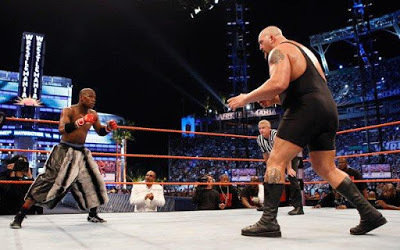
Of greater concern is the type of video which caused my awakening. These videos start by briefly setting the scene and then assuring the viewer 'you won't believe what happens next.' Despite never being faintly surprised, let alone shocked by any of these endings, I kept watching more. Even knowing that watching these videos ultimately and inevitably produced disappointment, I kept watching them in the hope I would be surprised...at least once. Or perhaps I was watching for some other more sinister reason?
'Every banana does this' says the caption, as footage of a person placing a banana on a plate into a microwave oven fills my screen. I've seen dozens of food based videos which achieve nothing other than waste ridiculous quantities of food, and consume time like a ravenous wolf.
'You won't believe how he reacts' says the caption across a video showing a man standing next to a woman who is blindfolded and holding a set of large carboard cue cards. I've seen dozens of relationship based clips (wedding proposal, confessions of infidelity etc) which are not only lengthy and boring, but probably staged. The anticipated reaction, the lure to hook the viewer, is completely predictable. Time? Gobble. Gobble. Purpose? Unclear. Artistic value? Zero. I'm sure you get the picture.
'You won't believe what happens next' says the caption. The video shows a car pulling out on to the road and inadvertently (it looks accidental) cutting off a motorcyclist who then has an ongoing argument with the driver. Road rage is shameful. Recording road rage for the entertainment of others is demeaning. Yet, I watched quite a few of these videos as well during my darker days.
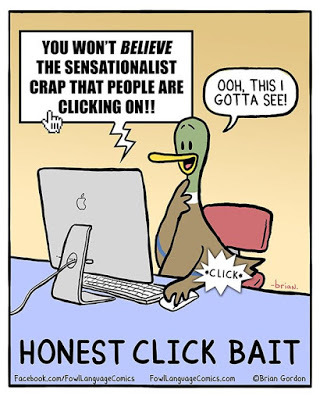
This is my confession of a short addiction to what some people call entertainment. There are thousands, maybe tens of thousands, maybe more - of these videos. There are channels dedicated to producing embarrassingly banal videos which are an audio/visual version of chocolate for sweet tooths. A treasure trove of vicarious living.
The clip which broke the camel's back involved a woman parking across a private driveway. When asked not to park there by the owner of the house, she ignored the request and walked away. After watching the unsurprisingly disappointing end, I reflected-as I do. What I watched was adults behaving badly. The video was a pathetic attempt, by the 'victims' to justify childish behaviour. To gain sympathy for the outrage committed against them.
I suddenly felt sad. So much of what entertains us, depicts the bad behaviour of others, and we love it. We love watching other people stuff up, act selfishly, wickedly. We love to watch people get hurt. We love to watch others fail. Why? Probably, because it makes us feel better about ourselves. It is yet another form of self medication.
For those who have eyes to see and ears to hear, the insidious message is clear. Ease your own suffering, by enjoying the suffering of others. Ignore your own shortcomings by lampooning the weaknesses of others. Avoid or ignore your own troubles, by pointing fingers of blame at everyone else.
For me, this was short, sharp lesson, and I won't be watching anymore of those stupid videos.
December 30, 2020
The Mirror: The Real Magic of Christmas
Leaving aside the eternal debate about whether Die Hard is a Christmas movie or not (it is in my opinion), most people have a favourite. Christmas movies, in my opinion, are not only those about Christmas, but those set at Christmas time and those which capture the true spirit of Christmas. There is a huge catalogue of Christmas movies which are usually viewed at Christmas time, and so it was that as this Christmas approached we decided to watch a few. We kicked it off a little early with Christmas Jars: a new film for which we had a free double pass. Christmas Jars is a terrific film. Heartwarming and funny and completely safe for family viewing, unlike many modern PG films.
The next one we watched was a film on Amazon Prime called Lucy Shimmers and the Prince of Peace. If you're allergic to Jesus and Christians and people praying in movies, or if you're resistant to the idea that people practicing Christian faith can actually have a major positive impact on their lives and the lives of others, then give this one a miss. Christmas Jars is a Christian film but not explicitly so. It's a story about generosity. Lucy Shimmers is unabashedly evangelical, but lest that turn you off, let me make it clear that the theme of Lucy Shimmers is redemption and redemption is a also a major theme of Christmas. The birth of Jesus Christ was the first stage in God's plan to redeem us.
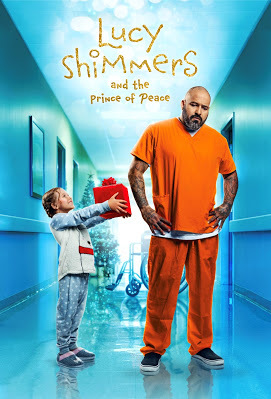
It's a little hard to talk about Lucy Shimmers without giving the story away, but switched on viewers will figure it out quickly anyway. Spoiler alert. Lucy is a five year old girl who is dying. She starts seeing and talking to her dead grandfather who is an angel. He helps her, more than anything or anyone else, to deal with her illness. In hospital, she meets Edgar a convicted criminal who is also dying. Lucy visits other patients in hospital as well, and makes friends with them all, blessing them with kind words and time. Lucy also writes a book about a dream she had. The way all these threads are tied together is magical. As with Christmas Jars, you will need tissues to watch Lucy Shimmers. Unless you have a heart of stone, this film will mess you up. Lucy Shimmers and the Prince of Peace perfectly demonstrates the power of love and grace.
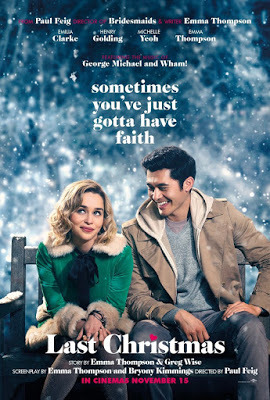
In a different vein, Last Christmas is also rated PG but it's the kind of PG which makes you wonder what the film classifiers were drinking when they viewed the film. (Lots of sexual references, one night stands, a lesbian relationship, and bad language. While viewers will fall in love with Lucy Shimmers immediately, and not long after also feel great compassion for Edgar, in Last Christmas it's a struggle to feel anything but antipathy for Kate who, like David Lavender in my novel Loathe Your Neighour, is highly skilled at making bad choices. She comes across as reckless, selfish and oppositional. However, once the viewer learns the reason for Kate's behaviour, there is automatic compassion for her. There's real character progression in this story which, apart from the twist which blew me away, is what kept me interested. The catalyst for the transformation/redemption of Kate is her encounter and subsequent relationship with a mysterious person who (spoiler alert) it turns out is also an angel. Incidentally, if you're a George Michael fan, he provides the entire soundtrack for Last Christmas.
All of these films show the viewer something magical and Christmas is magical. It's over now for another year. As I write, we are heading into a New year in which everyone is placing their hope. COVID-19 wrecked 2020. 2021 will be better. It can't be any worse. This is what people are saying, but for me hope is in Jesus and the power of love and grace to redeem us, to save us. The magical thing about Christmas is that God became a man in order to deliver us from hopelessness. Not to make out lives perfect. Not to remove trouble and suffering but to show us the value of it.
It's easy to watch films like Christmas Jars and Lucy Shimmers and the Prince of Peace and dismiss them as corny, feelgood films in which the characters don't act like real people, and the outcomes are literally incredible. It's easy to watch the redemptions of Edgar in Lucy Shimmers and Kate in last Christmas and write them off as glib. It can't be that easy, and let's face it, happy endings only belong in fairy tales, not real life. That kind of cynicism traps people in circumstances which they don't like, but they needlessly accept. The hope of the producers of these kinds of films is not just that the viewer will be entertained but that they will be transformed.
Why not give anonymous gifts (Christmas Jars), befriend lonely strangers (Lucy Shimmers) or volunteer at a homeless shelter (Last Christmas)? Why not try to solve your problems by looking beyond them? Irrespective of whether you believe in angels or not, why not talk about them as though they were real? Why not let hope so take root in your heart that you fell invincible? Why not share with others the grace God has shown you? What harm can be done by being more loving, more kind, more thoughtful and more generous?
December 23, 2020
A Dog's Eye: The Ultimate Investment
I didn't read The Barefoot Investor from cover to cover, but I still reviewed it and I'll
explain why. I didn't read it all because not all of it is relevant to me at the moment. I gave it a five star review because it rings true. Despite the failings it shares with all self help books, it has an undeniable credibility. It is also inspirational, funny and very practical. This is the kind of book you buy and read through, then re visit those sections of most interest depending on where you are at. Later, you'll pull it off the shelf and dive in for some more wisdom from someone who clearly knows what he's talking about. I felt really encouraged after reading The Barefoot Investor. If you're a bit messed up with your money -most people are- get yourself a copy.
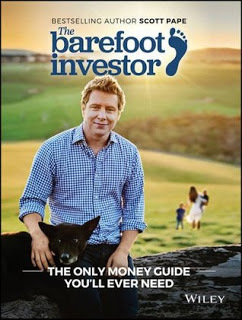
It's probably a timing thing...it's definitely a timing thing for me. I added this book to my 'to read' list two and half years ago when I was in the middle of a financial crisis. I didn't read it then, but as I had hit rock bottom, I sought help elsewhere, entering into a Part 9 debt agreement with a debt consolidation company. The type of company which Scott Pape doesn't endorse, mainly because they charge a lot for the service. It cost me over five thousand dollars in fees to have this company help me, but it has been worth every cent.
I was never good with money and the yardstick by which I measured success was how often I struggled. For most of my adult life, I have just gotten buy. Always having to make decisions based on the cheapest option, or whether a particular purchase was necessary or not. Saying no more often than yes, and much more often than I wanted to. I learned quite late that I was a stingy person. I had inherited, or absorbed by observation, the parsimony of my father. I also made selfish decisions about how to use my money, some of which had terrible consequences. I am still living with the consequences of those choices.
Over the years, I've learned two major lessons about money.
1. I am called to be generous, not stingy. There are many verses in the Bible which speak against stinginess, but when I read this one, I was convicted. Years and years of calling myself a good steward of money, and being careful, covered up a mean spirit.
"One person is generous and grows all the more wealthy, but another withholds more than he should and comes to poverty." (Proverbs 11:24)
2. God is my provider. When I lost my job in 2018 and was down to my last two hundred dollars, I recall looking in the mirror, and seeing the anxiety written on my face. God spoke to me, asking a simple question: 'Do you trust me?' For most of my working life, I worked for wages: regular pay deposited into my account. My lifeblood. The second great lesson I learned when I answered God's question honestly with a 'no', was that Christ is my lifeblood. After confessing that my trust was not in God, but in my job, I decided to really trust God instead of just saying that I did. Very soon afterwards, I got a job; a very good job in which I am still employed.
"My God will supply all your needs according to his riches in Christ Jesus." (Philippians 4:1)

How does this post about financial security connect with Christmas. Simple really. Among other things, Christmas is a celebration of giving. We celebrate the birth of Jesus Christ, God's greatest gift to mankind: the messiah, the saviour. His was the ultimate investment; an investment in people. In us, his children. This investment is a gift which keeps on giving because God is so generous.
The Barefoot Investor speaks only very briefly about the virtue of generosity, but it is in fact the true key to financial freedom. God is generous and we should be too.
December 12, 2020
A Dog's Eye: Launching Scorpions
My sixth novel was unleashed on the world last week. Scorpion's Breath joins shelf mates, Devolution, Loathe Your Neighbor, Ashmore Grief, A Muddy Red River and Love Sick Love.
I started writing Scorpion's Breath while I was working on Love Sick Love, but it got shelved until such time as I could write that kind of story. It was really only an idea, perhaps a dream to write something fun and light; something easy to write and entertaining for the reader. In short, because of how emotionally intense it was to write Love Sick Love, I wanted to write something different. Unfortunately, the circumstances of my life at that time exacerbated my somewhat negative feelings, and strengthened my resolve to get it all out of my system.
When I finally returned to the idea of Scorpion's Breath, I wrote it quickly and easily. Divorced from any auto biographical content, and removed from reality, it was a chance to have a party. Scorpion's Breath is a literary version of a personal happy dance.
Although not without humour, my earlier novels dealt with much more serious themes. Grounded in reality and focused on dysfunctional relationships, they reflected the challenges of my personal life, as well as the every day sights, sounds and experiences which I have always integrated both into my writing and into my character.
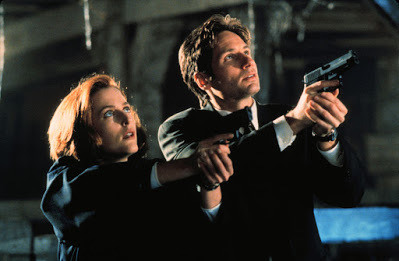
I can't remember the origins of Scorpion's Breath, but let's just say I love The X-Files and Supernatural, so certain elements from these two iconic television series have no doubt influenced it. However, I've never been satisfied with the post modern narrative which champions relative morality and always raises a human saviour. One of the things I liked about The X Files is that they avoid always needing rationalistic explanations for the weird stuff Mulder and Scully encounter. Funnily enough, Supernatural presents supernatural explanations for everything, and yet our human saviours, Sam and Dean Winchester, always triumph. These exceptional shows blur the lines between right and wrong, between natural and supernatural, allowing the viewer to make up their own mind. I am not a humanist though, so I feel the weight of what is missing.

I am a supernaturalist who is fascinated by religion and mythology. As a Christian, I've chosen my path and made my stand, but that does not stop me exploring the world I can see as well as the one I can't. I view it all through the prism of my faith in Christ Jesus, which means I see echoes and shadows in many people, places and situations. The interplay between the worlds is what I explore in Scorpion's Breath, but that is not all. It's also about relationships, about power and about forgiveness. And did I mention there are lots of demons?
Let the reader extract what they will with respect to deeper meanings, but let them be entertained while doing so. Scorpion's Breath is supposed to be fun, but naturally I have something to say. I always have something to say. I guess that's one of the main reasons I write. When no one but God is listening, or those who do listen don't understand, I can 'put pen to paper' and I have a voice. I'm learning, growing into a better man and writing is an important tool for me to facilitate this growth as I work my way through the rollercoaster ride we call life.
November 27, 2020
A Dog's Eye: Taught by the court
I've appeared in courts of law four times in my life...so far. Each time I was in a different role, and at a different stage of my life. Only my most recent experience was without considerable anxiety. Many people I know have never been to court and in the normal course of events, most are unlikely to. It is not an experience to which anyone of sound mind aspires, nor is it normally considered positive.

In 1983 I was fifteen years old when I found myself in the Sutherland magistrates court charged with several offences relating to the theft of a motor vehicle. The vehicle in question was the same one in which the police found us pretending to sleep one night. I pleaded guilty to the charges, knowing I was guilty of numerous others for which I had not been called to account. Most seriously, I was guilty of breaking the trust of my parents. Having been sentenced to a two year good behaviour bond and fined, I accepted my punishment and determined to end my criminal endeavours.

In the late 1990s, I was at university. I returned to my car after a lecture to move it because I had been parked in a two hour parking zone. I did this not only because I did not want to be fined but also because I had been cured of 'criminal' behaviour. Unfortunately my effort to do the right thing resulted in a parking fine which I decided, as was my right, to contest in a court of law. At this appearance in the Redfern magistrates court, I was anxious despite believing myself to be in the right. Memories of my previous appearance many years earlier and the not often publicly declared warning about 'little guys' taking on the system in courts of law, played on my mind. The result on this occasion, following the ranger who issued the parking infringement denying that my car was in a different place when he booked me, was a reprimand from the magistrate. His Worship said that although I was not guilty of breaking the letter of the law, I was guilty of breaking the spirit of the law. I was ordered to pay the original fine plus court costs. I have never repeated the action which led to my second court appearance.
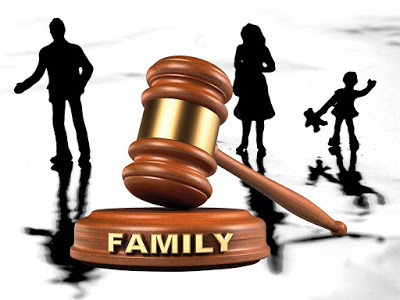
In my third court appearance, (2015) I was representing my fiance at the time in a custody case against her ex partner. I became something of a lay expert on family law, spending hours poring over evidence and legislation to put together a case which resulted in what I thought was a satisfactory outcome: a win. I regret doing that. Although my intentions were good, getting involved to that extent was another sign of the dysfunction of that relationship. The series of mediations, the long trail of emails, and the hearings themselves at the Family Court were intense, emotionally draining and resulted in me sometimes losing the better parts of myself inside the worst parts of myself. The battle to maintain my integrity was constant. That description fits my relationship with that person as well. God forbid, I should ever find myself again in such a situation.
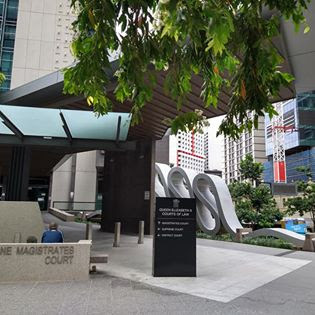
I've just returned from Brisbane where I travelled to appear in a trial at the District court as a character witness for the defendant; a friend and former colleague of mine. I agreed to help my friend without hesitation, and so it was with confidence that I presented my statement to a jury in the presence of a judge. The case lasted four days. My part lasted somewhere between five and ten minutes. I was one of four character witnesses, but equally important to what I said in court was my presence. My friend had this very heavy dark cloud hanging over his head for well over a year, having been charged with a crime he did not commit. I'm sure the fact we were physically present with him, helped not only his case, but also him personally. I had to return to work so I was not in court to hear the verdict, but our prayers were answered. My friend called me to tell me the outcome. He was so excited and relieved, I thought he might somehow jump through the phone. His main job now will be to forgive his accuser and move forward with his life. This will be very difficult. Very difficult.
In all of these cases, I have no problem with the decision of the courts. There was justice for all, and there were also lessons to be learned. This is not always the case. For me, I am thankful that my appearances in court have helped shape me for the better, and in the most recent case, helped a friend avoid the more serious and permanent consequences of injustice.
November 21, 2020
The Mirror: Peace in the midst of angry birds
I'm almost always behind the times with respect to fashion. Whether it be clothing, technology, music or whatever, I'm not an early adopter. I've even been known to deliberately avoid really popular bands or TV shows. Coldplay and Game of Thrones would be notable examples. I don't like the former and I've never watched the latter. All that is by way of introduction to this post, the title of which obviously refers to the video game, Angry Birds. Released in 2009, it quickly became a sensation. I recall playing it a few times and being angered by it rather than entertained.

In 2016, long after the game had dropped off the radar, Sony pictures produced a film based on the game. Due to its success, they made a sequel in 2019. Which brings us to family movie night last night. My daughter chose Angry Birds 2. When I told her I had not seen Angry Birds, she said she hadn't either, so eventually I was able to explain to her the logic of watching the original movie before the sequel.
The main character in Angry Birds is Red, who has a problem with his temper which sees him sentenced by the judge to anger management classes which is the most severe punishment available. I'll now point out the obvious irony in case you missed it. Red is an Angry Bird who lives on Angry Bird island, but gets into trouble with the law for his anger fueled actions.

Interestingly, I thought Red's main problem was his negative attitude. He was a sarcastic whinger who ended up living outside of town, on his own, because nobody liked him. Later in the film, the audience is invited to feel sorry for Red because he was orphaned at an early age and was bullied at school. However, and this brings me to my main point, Red had a choice about the kind of bird he became. He could blame circumstances and blame others, but ultimately he was free to choose how he responded and reacted to to the happenings and birds in his life.
It may seem like a long bow to draw; perhaps even an insensitive one, to now talk about Viktor Frankl's powerful and best selling book, Man's Search for Meaning, but it's relevant. There is a connection. Of all the truly profound things, holocaust survivor Frankl says, the one that really struck me was where he talked about the final and ultimate freedom that all men have irrespective of the horrific situations they may find themselves in. The freedom to choose how to react.
"Everything can be taken away from a man, but one thing, the last of the human freedoms-to choose one's attitude in any given set of circumstances, to choose one's own way."
Another book I am reading at the moment is called Finding the Peace God Promises. In it, author Ann Spangler suggests that much of what we get angry about isn't worth the energy we expend, nor the time we waste. We rob ourselves of peace by fighting wars that are either unwinnable or unnecessary. In a world where most people are struggling for control, our attitude is one area which causes conflict but one which we can control simply by making good choices.
November 8, 2020
Snake Oil: Democratic Trump
Based on outgoing US President Donald Trump's strong anti China stance, my wife was hoping he would win another term in the White House. She's from Vietnam, whose government is essentially a Chinese puppet regime. She's one of the proud Vietnamese citizens who resent Chinese interference and control. It was either on my first or second trip to Vietnam that I found myself in an anti China protest march on the streets of Ho Chi Minh's city District One. I remember well the depth of feeling in that crowd.

My wife is so anti Chinese that we are not allowed to purchase products made in China unless there is no other option, and even then, sometimes not. She loves politics and is very up to date with the news, although I would question the objectivity of what she reads. She suspects the Chinese people she meets in her new home, Australia, of being spies and has a general dislike for China's citizens and Australian Chinese immigrants.
She's open minded enough and intelligent enough to be learning from her personal experiences that painting everyone with the same brush is not only only wrong, but quite racist. On the question of the value of Trump there was no point arguing against it. "Make America great again", she would quote at me.
Anyway, steering around the topic of the 2020 US presidential election, was relatively easy. I find politics fascinating but am more interested in my homeland, Australia, than America. I was quite ambivalent about Donald Trump from the beginning and remain so today. In some ways, I admire him, in others I find it had to respect him or take seriously what he says. It's not my intention to discuss US politics in general or to specifically comment on the one term presidency of businessman Donald Trump. I know enough to know that I shouldn't be writing extensively on topics about which I have limited knowledge. I'm also wise enough to realize that some arguments are not worth having.

The Aussie and US political systems are quite different beasts, despite a number of similarities. Perhaps the most significant difference is that, unlike Americans, Australian's do not vote directly for the leader of their government. Here are some other notable differences:
The US President is both head of state and head of the government. The Australian Prime Minister is only head of the government.The executive arm of the government in America is appointed by the President from people outside the congress (ie.,parliament in the Westminster system). The executive arm of the Australian government are elected members of parliament.US Presidents serve fixed four year terms, Australian Prime Ministers serve for around three years and can call early or late elections as they see fit. Unlimited terms for Prime Ministers, maximum two terms for Presidents.Australians must vote in elections. Americans can take it or leave it...and the majority do exactly that.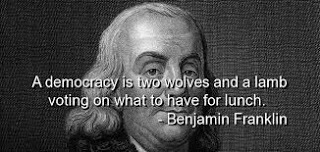
In the Gettysburg Address, democracy was described as government of the people, by the people, for the people. Churchill famously said that democracy was the worst form of government except for all the others. Roosevelt and Gandhi felt that democracy would fail without education. Bertrand Russell though that democracy simply gave fools the right to vote which he contrasted with dictatorships which gave fools the right to rule. Many famous people have made fascinating and insightful comments about democracy since its birth in ancient Greece up until the modern era in which democracy is a popularity contest and its actors men who are regularly lampooned and criticized no matter they do or don't do.
On balance, I'm pleased Donald Trump was defeated by Joe Biden, but America is not a country I hold in especially high regard, and its doubtful that the change of president will result in anything but a return to normal (pre Trump) transmission which if nothing else will be far less controversial, polarizing and antagonistic. What will it mean for me personally? Not much.
Having avoided upsetting my wife by not arguing against Trump and his often embarrassing behaviour, nor being unsympathetic to her views and the background underpinning them, I will continue to enjoy a peaceful relationship with her. I will also continue to be choosy about what I accept as truth, knowing full well that snake oil and politics go hand in hand.



